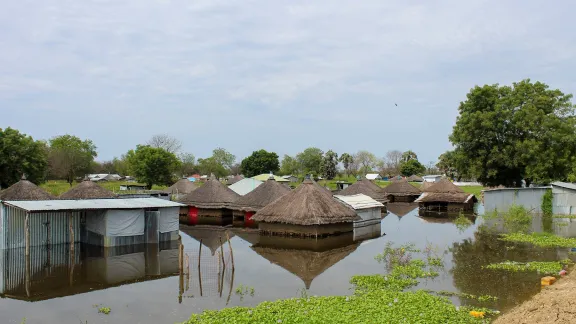
In the Hai-Machuor area in Bor all residents have been displaced by flooding. Photo: LWF/M. Chol
Promoting food security with home gardens
(LWI) - In July 2020 nearly seventy percent of Twic East County’s population in the Jonglei state of South Sudan was displaced due to severe flooding. The Lutheran World Federation (LWF) World Service, with funding from the Food and Agriculture Organization of the United Nations (FAO), continues to support recovery efforts through livelihood training and agricultural resources so vulnerable community members can create home gardens for food and small income generation.
Recovering from unprecedented flooding
Heavy rainfall followed by unprecedented flooding in the state of Jonglei left thousands of people stranded due to cut off roads and the water washed away crops, property and livestock. This led to food shortages and increased vulnerability of women led households who rely on selling their produce to feed their family.
Awak Aguer Ajang, age 41 and mother of three boys and four girls, moved to Panyagor, a village in Jonglei, when the floods came. She struggled in the flooded areas in Pawel village of Kongor Payam, eight kilometres south of Panyagor centre, for two years before deciding to leave. “As flooding increased and my house got submerged, I moved to Panyagor centre with my family where my relatives assisted me with plastic sheet of tarpaulin to build a small shelter. My decision to relocate to Panyagor was due to the lack of resource to transport my old husband and seven young children" she says. Ajang’s husband is 75 years old and unable to work to meet the family’s needs.
LWF World Service’s Emergency Food Production focuses on building resilience during the dry season for the most vulnerable people in Twic East County. Ajang’s household is one of1,500 participating in the FAO funded project. Participants are provided with vegetable farming kits which include okra, tomato, eggplant and carrot seeds. They are then trained in agronomic best practices such as row planting, early planting and other skills that allow them to increase their agricultural independence.
Having a small vegetable garden that is protected and less vulnerable to floods allows community members to have more control over ensuring they can meet their most essential food related needs in times of disaster.
"The project provides a long-term solution to food insecurity while also addressing immediate needs. Many participants may still face challenges when the dry season is over, since it is likely to flood again. But having a small vegetable garden that is protected and less vulnerable to floods allows community members to have more control over ensuring they can meet their most essential food related needs in times of disaster.” says Mika Jokivuori, LWF country representative for South Sudan.
Farming the garden for home and the market
“I planted all the seeds I received from the project, and managed to cultivate tomatoes, okra, eggplant, carrots. And with the skills I received in training, I had a good harvest especially with the okra. I sold some of the produce and I earned a little cash in just two weeks” Ajang added.
Like many participants of the project, Ajang is the provider for her family. She ensures they have food and that their basic needs are met. The vegetable garden allows her to have produce for meals at home and a portion of the harvest goes to be sold at the nearest markets. “As vegetables grow,” Anja says, “I harvest, cook and feed my children with vegetable, and I am very happy about that. My livelihood is more stable because with this vegetables production, I am supplying the market and earn monthly income from selling green vegetables to consumers in Panyagor. I have been doing this since November 2021 which has helped me cover other basic needs such as clothes and medicine for my family.”
By Mawel Chol (LWF South Sudan) and LWF/T. Rakoto


